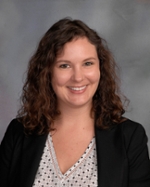American Psychological Association Division 50

Where do you work and in what capacity?
I am an applied social psychologist, and I am currently an Assistant Professor in the Psychology Department at Rowan University. I teach undergraduate and graduate classes and mentor students in our Clinical Psychology PhD program.
Where did you do your training?
I started my path majoring in Psychology and minoring in Sociology at Eastern Illinois University, which is close to where I grew up. I worked in two research labs as an undergraduate—a cognitive lab examining visual and haptic illusions and a social lab examining prayer and religious practices. I completed an undergraduate honor’s thesis conducting a factor analysis on types of prayer. I continued my studies, eventually earning my Master’s in Experimental Psychology at the College of William and Mary. My Master’s thesis examined attentional and affective responses via EEG to alcohol and smoking stimuli. Following my Master’s program, I attended the University of Houston, where I earned my PhD in Social Psychology, working with Dr. Clayton Neighbors. During my graduate training, we wrote an R01 that was funded my final year of the program, so I was fortunate to be able to lead this project as a postdoc. After my postdoc, I became a faculty member at Rowan in the fall of 2018.
What are your research interests?
My research interests are broadly focused on social and individual difference factors that influence health behaviors, with a particular emphasis on alcohol use. I am particularly interested in understanding mechanisms of action underlying effective interventions to refine existing intervention strategies and develop novel intervention strategies aimed at decreasing problematic health behaviors and improving health and well-being. My current research program employs personalized normative feedback and expressive writing interventions to reduce alcohol use and alcohol-related problems. I am also interested in examining event-specific high-risk drinking occasions and factors that influence the positive association between alcohol use and physical activity.
How did you become interested in addictive behaviors?
The short answer for where my interest sprang from is outside circumstances. The longer answer reveals that most career trajectories are winding paths rather than a linear progression. As a first generation college student, I had no idea how to navigate college, let alone graduate school. I was fortunate to have mentors who helped me at every stage of the process. My first research experiences in social and cognitive psychology are completely unrelated to what I do now, but gave me the skills and experiences I needed to continue my education and figure out my interests. I completed a research internship one summer that shaped my interest in research methods and, in particular, the use of psychophysiological measures. I then applied to graduate programs based on my interest in psychophysiological measures. At William and Mary, I originally intended to pursue EEG research on stereotyping and prejudice but was asked if I was interested in EEG research on alcohol and smoking research, and so I decided to give that a shot. I’m so glad that I did because I stumbled upon an area that has become my passion.
Any other information that you would like to share about yourself with other SoAP members?
I have two adorable dogs, Maxwell and Bella, who keep me on my toes. They are very happy that I bought them a house with a yard. A recent hobby I have really enjoyed is making jewelry. I also enjoy baking, playing bocce, reading for fun, spending time with my partner and my family and friends, country line dancing, and trying new bubble tea shops.

Resources are available for those struggling with addiction and numerous effective treatments exist. Whether you are looking for help for yourself or a loved one, we encourage you to seek out help.